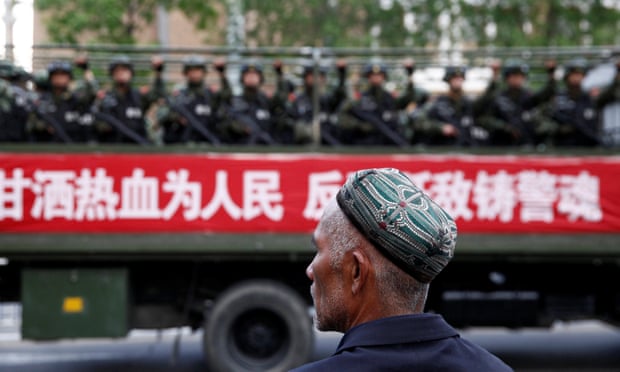
Hundreds of thousands of Uyghur Muslims in China’s far west have been forced into propaganda camps for patriotic “re-education,” according to rights groups. Now the practice has the backing of local law, thanks to an Oct. 9 revision.
According to the new Article 33 of the Xinjiang region’s regulations against extremism (link in Chinese):
Educational transformation institutions such as vocational skill education and training centers shall teach the national common language, laws and regulations, and vocational skills. The centers should organize and carry out anti-extremist ideological education, psychological correction, and behavior correction to transform the thinking of the trainees so as to help them return to society, and to their family.
The wording above is significantly different from what was in the previous version of the law (link in Chinese), in effect since April last year. In the older version, a chapter called “Prevention, containment, and elimination of extremism,” advised “concentrated education” and “behavior correction” against extremism, which it defined as inciting hatred, discrimination, and violence. It also advised “humanitarian care” and did not imply separation of families, as in new article does.
In the wake of deadly ethnic clashes between Han Chinese and Uyghur Muslims in Xinjiang in 2009, China clamped down on freedom of religion in the Xinjiang region. Last year’s anti-extremism rules even placed restrictions on citizens’ beard length and clothing. Uyghur Muslims are not free to leave the country or to move around the region; in a peculiarly invasive kind of surveillance, they must host also government officials for “home stays.”
Credible reports of “re-education” camps where large numbers of Uyghurs are detained began surfacing last year. In August, a United Nation body on racial discrimination that received submissions from rights groups and the Uyghur diaspora about the situation in Xinjiang expressed concern about the mass detentions. An estimated 660,000 people have been forcibly sent to undergo detention for “de-radicalization,” according to advocacy group Chinese Human Rights Defenders, and more than 1 million people have also had to attend day or evening sessions to inculcate patriotic sentiment.
China earlier denied that such camps exist. Now the official line, repeated recently in an interview with NPR by the country’s ambassador to the US, appears to be that the camps do exist, and that they aim to combat Islamic radicalization and provide skills training.
About half Xinjiang’s population of 22 million belong to the Uyghur ethnic minority, with historic ties to central Asia. Immigration by Han Chinese, the country’s majority community, has seen the Han population of Xinjiang rise from under 7% (pdf) at the time of the country’s foundation to about 40% now.
Even before the existence of the camps was widely reported, critics of China’s Uyghur policies said that authorities were so sharply repressing religious expression in the name of fighting terror after the 2009 riots, that it risked actually radicalizing people. In 2014, a knife attack at a train station in southwestern China that killed nearly 30 people was blamed on Uyghurs, as was a car attack in Beijing a year earlier.
Source: Quartz
